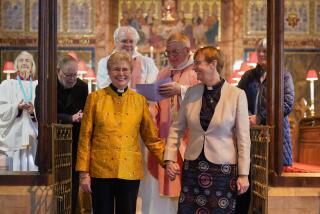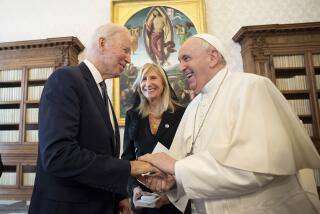In England, there’s no separation of church and state
- Share via
Religious conservatives in the United States have been complaining that developments in the political arena – the Obamcare contraceptive mandate, the progress of same-sex civil marriage – threaten religious freedom. They’re crying wolf, but similar alarums in the Mother Country make a bit more sense.
Because England has an established church, some of whose bishops sit in Parliament, the political question of same-sex marriage has religious reverberations that don’t sound here. Meanwhile, the Church of England’s surprise decision not to approve the ordination of women as bishops has caused a stir at Westminster, with Prime Minister David Cameron urging the church to “get on with it, as it were, and get with the program” and some parliamentarians suggesting that the church should lose its exemption from laws against sex discrimination.
It isn’t clear that approval of same-sex marriage by Parliament would require priests of the established church to officiate at gay weddings in church, as some British conservatives fear. But the absence of a wall of separation between church and state in England has led to situations in which members of Parliament, including non-Anglicans, have made essentially religious decisions.
The most famous example came in the 1920s when the House of Commons rejected a new Book of Common Prayer that restored some elements of Catholic worship to the Anglican liturgy. (Some so-called Anglo-Catholics also opposed the book because they feared it would make it harder for them to import other “Romish” ceremonies. That odd alliance of Evangelicals and Anglo-Catholics was mirrored in the debate in the church’s General Synod over female bishops.)
American evangelicals and Catholics who cry wolf about threats to religious liberty in this country should cast an eye across the Atlantic and count their blessings. President Obama would never demand that the Roman Catholic Church “get on with” admitting women to the ranks of priests and bishops, and it’s inconceivable that Congress would apply laws against sex discrimination to the hiring of clergy – and, if it did, the Supreme Court would swoop down with a vengeance, hurling constitutional anathemas. Priests who don’t want to officiate at same-sex religious weddings are free under the 1st Amendment to say no. They and their bishops, unlike clergy in the Church of England, are not civil servants in dog collars.
Granted, in a modern welfare state in which churches and government interact in the provision of healthcare and other services, tricky questions will arise. Take the current hot-button issue of whether the Obama administration can require hospitals affiliated with the Catholic Church to offer their employees contraceptive services as part of a standard health insurance plan. Defenders of the administration argue that a religiously affiliated institution that employs people of many faiths should be bound by laws that bind secular employers. Advocates for the Catholic bishops insist that the contraceptive mandate violates the 1st Amendment and the Religious Freedom Restoration Act, which protects religious practice above and beyond what the Constitution requires.
Who’s right? The Supreme Court likely will decide. But however the court rules, religious liberty will remain more robust in this country than it is is England. For that, America’s religious leaders should thank God – and the Framers.
ALSO:
Karl Rove can’t handle the truth
Why Petraeus strayed -- and it’s not what you think
More to Read
A cure for the common opinion
Get thought-provoking perspectives with our weekly newsletter.
You may occasionally receive promotional content from the Los Angeles Times.










